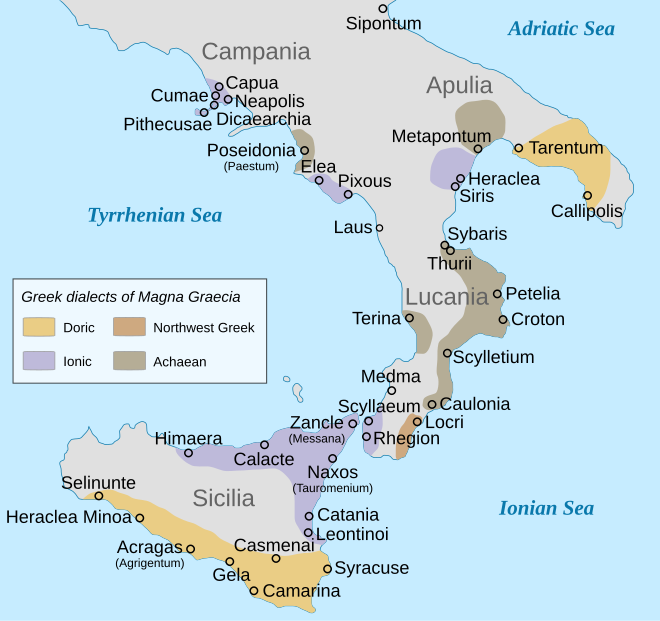The Wild West of the Greeks
Western Greekness and its peculiarities

Map of Sicily and Southern Italy (also called Magna Graecia or Megale Héllas) colonized by the Greeks. The different Greek dialects spoken depended on the polis from which the founders came. Image from Commons.wikimedia.org
During the Archaic Age, individual groups of citizens emigrated from Greek poleis to establish new settlements in Italy and Sicily. These new Sicilian and Italic cities maintained cultural and religious ties with their motherland, particularly honoring the figure of the oikist, the founder of the polis, yet they were completely independent politically and militarily. The Greek colonists had to interact with the indigenous populations, with varying outcomes depending on the region.
In Sicily, the indigenous people were overwhelmed by Greek expansionism, and many of them became agricultural laborers, while Italic populations inflicted heavy defeats on the Italic poleis. There was also partial integration, with the Hellenization of local elites and mixed unions, as often only men emigrated from the motherland. The Greeks in the West also faced the expansionism of the Carthaginians, Etruscans, and, from the 4th century onwards, the Romans. The need for order and security, driven by external and internal conflicts, also due to social mobility, typical of a colonial and frontier society, led almost all the Western poleis to adopt tyrannical governance, which was more successful here than in Greece.
Notably, Syracuse was ruled by several powerful tyrants at various times in its history, such as Gelon, Hieron I, Dionysius I, and Agathocles. Tyrants like Dionysius I were described as "warlords," as their rise and legitimacy were often due to a constant state of war and the support of barbarian mercenaries. In the colonial context, the concepts of city and citizenship were not considered as sacred as in Greece; cities were frequently destroyed and founded, and citizenship was granted much more easily than in other poleis. At certain times, it seemed that some Western cities had no rivals in the Greek world in terms of wealth and power. For example, Sybaris in the 6th century was nicknamed "the city of excess," and Gelon, tyrant of Syracuse, positioned himself as the leader of the Panhellenic coalition against the Persian invasion, demonstrating the level of power his polis had achieved.
Book: Marco Bettalli, Anna Lucia D'agata, Anna Magnetto, Storia greca , Editor Carrocci, 2021
2025-08-27
Salvatore Ciccarello
